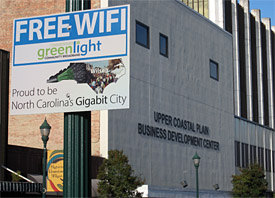
Fast, affordable Internet access for all.


Holly Springs, a town of about 25,000 in the Triangle region of North Carolina, has built its own network to connect community anchor institutions and has an interest in using it to spur economic development and other community benefits but a 2011 law pushed by Time Warner Cable makes some of that more difficult. City IT Director Jeff Wilson joined me for episode 107 of the Community Broadband Bits podcast.
We discussed why they decided to build a municipal network and how they have just finished the actual build. We also discuss the savings they anticpate from owning the network and how local residents were hopeful that the network could be expanded to connect homes and businesses before learning that state law restricted them from doing that. Read our additional coverage of Holly Springs.
This show is 13 minutes long and can be played on this page or via Apple Podcasts or the tool of your choice using this feed.
Transcript below.
We want your feedback and suggestions for the show-please e-mail us or leave a comment below.
Listen to other episodes here or view all episodes in our index. See other podcasts from the Institute for Local Self-Reliance here.
Thanks to Waylon Thornton for the music, licensed using Creative Commons. The song is "Bronco Romp."
WSOC TV in Charlotte recently looked at Salisbury's four-year-old Fibrant network. Reporter Tenikka Smith investigated what a municipal network could do for Charlotte. Charlotte is also one of the communities working with Google in hopes of having it expand to them. That interest has led AT&T to consider updating its comparatively pathetic DSL services as well.
Smith spoke with a Salisbury small business owner who switched to Fibrant in 2010. Rick Anderson-McCombs of the Sidewalk Deli noted fast speeds and high quality voice service from Fibrant. According to Anderson-McCombs' mother, Angenetta Dover, the deli also saves $30 - $40 per month compared to past service with the local incumbent. Dover also uses the service at her home and notices a significant improvement:
"Even (the) lowest speed and slowest speed is super compared to what we used to have to do," she said.
Robert Van Goen from Rowan County's economic development coalition, Rowan Works, believes a municipal network could be a smart investment for Charlotte. The network tells potential job creators that a community is "prepared to do business for the next 10, 15, 20 years and compete in the global marketplace."
WSOC TV compared prices; they found Time Warner Cable and AT&T offered basic triple-play bundles - up to 6 Mbps download - for $79 per month. Upload speeds, the real test for businesses, are typically much slower. Fibrant's lowest tier triple-play bundle offered 20 Mbps symmetrical service for $97 per month.
Saving money for better service is always a winning strategy. Local businesses often consider other benefits from municipal networks; Anderson-McCombs told Smith his motivation reached beyond financials:
In a recent New York Times article, reporter Kate Murphy shined a light on fiber's increasing role in economic development. Murphy discussed several of the same networks we have followed: Wilson, NC; Chattanooga, TN; Lafayette, LA; and Mount Vernon, WA.
Murphy acknowledged that successful companies are moving from major metropolitan areas to less populated communities out of necessity:
These digital carpetbaggers aren’t just leaving behind jittery Netflix streams and aggravating waits for Twitter feeds to refresh. They are positioning themselves to be more globally competitive and connected.
Murphy notes that countries where governments have invested in critical infrastructure offer more choice, better services, and lower rates. She also points to successful local initiatives, often in less populated communities where large private interests have not invested:
Stepping into the void have been a smattering of municipalities that have public rather than private utility infrastructures. Muninetworks.org has a map that pinpoints many of these communities. They are primarily rural towns that were ignored when the nation’s electrical infrastructure was installed 100 years ago and had to build their own.
Murphy spoke with several business owners that moved from large metropolitan areas to smaller communities because they needed fiber. For a growing number of establishments, fiber networks are the only kind that offer the capacity needed for day-to-day operations. Information security firm, Blank Law and Technology, moved to Mount Vernon to take advantage of its open access fiber network. It helps when customer service representatives live in your neighborhood:
 "We had to choose an area that could offer a low cost of doing business, while delivering an infrastructure better than that of other states and countries," wrote Mr. Kalinoski, a three-time, award nominee for his special effects contributions to Black Swan and LOST, the Final Season.
"We had to choose an area that could offer a low cost of doing business, while delivering an infrastructure better than that of other states and countries," wrote Mr. Kalinoski, a three-time, award nominee for his special effects contributions to Black Swan and LOST, the Final Season.On February 13, KKFI Community Radio from Kansas City, Missouri, interviewed ILSR's Chris Mitchell and Todd O'Boyle from Common Cause. Tom Klammer, host of the "Tell Somebody" show covered Kansas legislation SB 304 aimed at preventing municipalities from investing in their own broadband networks.
Klammer writes on the program website:
Recently Todd O’Boyle of Common Cause brought my attention to a Kansas Senate bill, authored by a cable industry lobbyist, which would outlaw community broadband in Kansas. Subsequently I came across an article online written by O’Boyle’s colleague Christopher Mitchell who wrote that the bill in question, if passed, would create some of the most draconian limits on building networks that we have seen in any state.
You can listen to the interview from the program website. The interview is a little under one hour.
 And it has, even for young entrepreneurs elsewhere in the state. For a tech entrepreneur like Dan Holt from Wake Forest, renting space at this Wilson-based incubator lets him be part of the future, and to experience the possible which is impossible at his home in Wake Forest only 30 miles away. Dan is a self-described techie for a local Raleigh defense subcontractor but he likes to be known as founder of the Wake Forest Fiber Optic Initiative.
And it has, even for young entrepreneurs elsewhere in the state. For a tech entrepreneur like Dan Holt from Wake Forest, renting space at this Wilson-based incubator lets him be part of the future, and to experience the possible which is impossible at his home in Wake Forest only 30 miles away. Dan is a self-described techie for a local Raleigh defense subcontractor but he likes to be known as founder of the Wake Forest Fiber Optic Initiative.

WUNC, a public radio station out of Chapel Hill in North Carolina, covered community owned networks and broadband availability on its recent "State of Things" midday program. I was a guest along with a local resident and a public relations executive from Time Warner Cable to discuss North Carolina's broadband compared to other states and its law that effectively bans local governments from building networks.
The discussion is good, though I certaily could have done a better job. Ultimately I thought the host did a good job of bringing in each guest to make their points, though Time Warner Cable was totally unprepared to talk about how North Carolina can expand access. Instead, they talked about the cable giant's requirements to invest in networks in rural areas.
We are going to follow up on these points but for now wanted to make sure you have a chance to listen to the show. Our coverage of the bill discussed in the radio show is available here.
WUNC 91.5, North Carolina Public Radio, recently introduced Greenlight to its audience. We have covered Wilson and Greenlight extensively since 2009. Will Michaels spoke with Will Aycock, highlighting the network's gigabit status.
"We're able to support the surveillance cameras and different sensors throughout the community to make us a smarter city. Certainly, we're able to support many institutions here such as schools and libraries," Aycock says.
"It's really about removing the barriers between our residents, our institutions and the Internet so that people have all the bandwidth they need."
In our 2013 case study, Carolina's Connected Community: Wilson Gives Greenlight to Fast Inernet, we documented the benefits to the community. Aycock commented on the role the network plays in bringing new residents and business to Wilson:
"We're actually seeing folks deciding to move to Wilson from other areas because they want access to this next-generation network," he says.
"People even decide, if they're going to build a house, where to build a house. For instance, radiologists want to be on the network because it helps them to more efficiently do their jobs from home."
Now if North Carolina's Legislature would just undo the 2011 power grab, when it passed legislation to revoke authority from communities to decide locally if building their own network made sense.